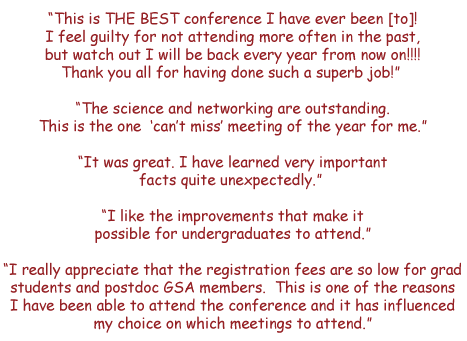|
Request Copy of Receipt
View Online Program Guide
View Regular Abstracts
View Late Abstracts
You are invited to attend the 54th Annual Drosophila Research Conference, sponsored by The Genetics Society of America. The
Conference will be held April 3-7, 2013 at the Marriott Wardman Park in Washington, DC.
The Conference will begin on Wednesday evening, April 3, with the Opening Session from 7:00 - 9:00 pm featuring Nobel Laureate Jules Hoffmann as the Keynote
Speaker, followed by a mixer from 9:00 - 11:00 pm. The closing plenary session will take place from 8:30 AM until 12:00 PM on Sunday, April 7.
Plenary Speakers:
Naama Barkai
Scott Barolo
Nancy Bonini
Andrea Brand
Tom Clandinin
Marc Freeman |
Greg Hannon
Martin Hetzer
Chris Jiggins
Leanna Jones
Jürg Müeller
Ilaria Rebay |
|
GRAND SPONSOR
Genetics Society of America
SILVER SPONSORS
Fisher Scientific
Genetic Services, Inc.
Rainbow Transgenic Flies, Inc. |
Naama Barkai (Weizmann Institute of Science) studies the logic of biological circuits. Her lab employs a multi-disciplinary approach—including experiments, dynamic-system theory, and computational analysis—to study how variability is buffered by, and can contribute to, biological circuits.
Scott Barolo (University of Michigan) studies the function and evolution of cis-regulatory transcriptional enhancer elements. His lab has focused on disentangling the complex “grammar” of transcriptional enhancers.
Nancy Bonini (University of Pennsylvania) uses Drosophila as a model for human neurodegenerative disease. The lab is focused on identifying pathways and molecules involved in Drosophila models of Huntington’s and Parkinson’s disease to enable development of novel therapeutics for these diseases.
Andrea Brand (Cambridge University) studies development of neurons from neural stem cells. Her lab has focused on the determinants of asymmetric cell-division and the regulation of stem cell self-renewal versus differentiation.
Tom Clandinin (Stanford University) studies how neuronal circuits assemble during development and how this process goes wrong in neurodegenerative diseases. The lab also studies how these circuits underlie computation required for behavior.
Marc Freeman (University of Massachusetts Medical School) studies the development and function of glia. Majorfoci for the lab include unraveling the genetic programs underlying glial development and function and studying neuron-glia signaling that contributes to neural circuit architecture.
Greg Hannon (Cold Spring Harbor Laboratory) studies small RNA biology. The lab is currently focused on the roles of microRNAs, endogenous siRNAs, and piRNAs in gene regulation, cancer biology, stem cell biology and transposon regulation.
Martin Hetzer (Salk Institute) studies extremely long-lived proteins and proteins that contribute to the structure and function of the nucleus. His lab is interested in how these proteins contribute to normal function, aging, and cancer.
Chris Jiggins (University of Cambridge) studies the genetic basis for adaptation and speciation in butterflies and moths. The lab has a major focus on the genetic underpinnings of mimicry complexes in Heliconius butterflies.
Leanna Jones (Salk Institute) studies the regulation of stem cells. Her lab is focused on understanding how the stem cell niche regulates stem cell behavior and the role of nutrition and aging in stem cell activity.
Jürg Müller (Max Planck Institute of Biochemistry) studies how chromatin-modifying and chromatin-binding proteins influence gene transcription. His lab focuses on how the Polycomb group and trithorax group genes maintain repressive and activating states, respectively.
Ilaria Rebay (University of Chicago) studies how signal transduction modulates cell fate specification. Her lab has focused on how the receptor tyrosine kinase pathway regulates embryonic and eye development.
Here is what others are saying:

2013 Meeting Organizers:
Richard Mann
Hannele Ruohola-Baker
Kristin Scott
David Stern
Like Genetics Society of America
on facebook


Follow this Conference:
#DROS2013
|